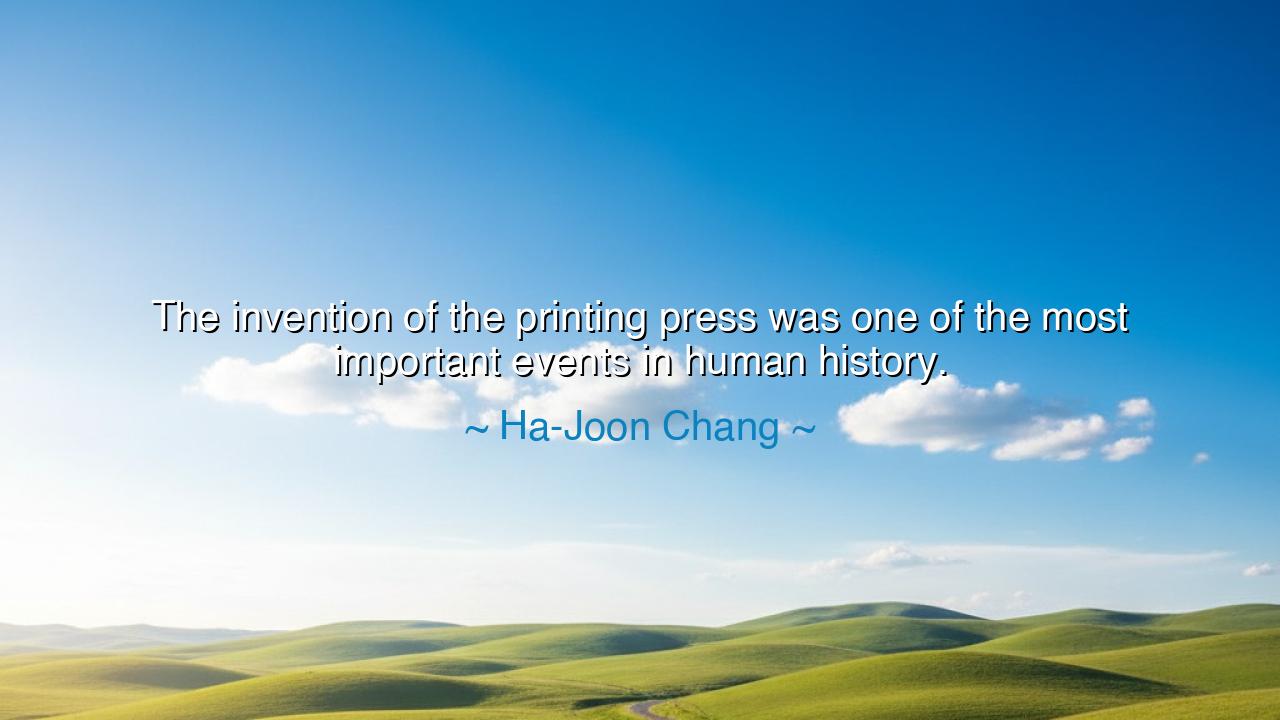
The invention of the printing press was one of the most important
The invention of the printing press was one of the most important events in human history.






“The invention of the printing press was one of the most important events in human history.” Thus declared Ha-Joon Chang, the historian of ideas and economies, whose words echo like a bell across the centuries. For in that single invention — the printing press — humanity discovered a new power greater than sword or crown: the power to multiply thought. With it, the silent spark of a single mind could ignite the world. Knowledge, once bound in monasteries and whispered in secret, was now unleashed to roam freely among the people. Chang’s statement is not merely praise for a machine, but reverence for a turning point — the moment when humanity found a way to preserve, share, and expand its collective wisdom beyond the limits of memory and mortality.
Before that moment, learning was fragile and fleeting. The Middle Ages were a world of scarcity — not only of bread but of books. Every volume was written by hand, a labor of months or years, each letter a prayer inscribed by candlelight. Knowledge belonged to the few — the priests, the scholars, the rulers — who guarded it as a treasure of power. The common man could not read, and even if he could, he would have no books to read. It was as though light existed, but behind a veil. Then, in the fifteenth century, a craftsman named Johannes Gutenberg forged a device that changed everything: a press of iron and wood that could stamp words upon parchment as swiftly as a blacksmith forges nails. In that moment, knowledge became fertile — able to reproduce, to multiply, to spread. The gates of wisdom burst open, and all the world began to pour through.
Ha-Joon Chang, an economist by trade, understood that inventions such as this are not mere curiosities of technology — they are the engines of civilization. For with the printing press came not only books, but a revolution of the mind. Ideas no longer belonged to a class or a church; they belonged to whoever had eyes to read. The press became the equalizer of intellect, the great democratizer of truth. It sowed the seeds of the Renaissance, that flowering of art and inquiry that rediscovered the dignity of man. It gave rise to the Reformation, when Martin Luther’s words, once confined to a pulpit, spread like wildfire through a thousand printed pages. It laid the foundation for the Scientific Revolution, allowing Galileo, Newton, and Descartes to converse across nations and centuries. Every movement of progress that followed — the revolutions of thought, of politics, of science — rode upon the press’s invisible tide.
Think of what came from that sacred machine. In 1517, when Luther nailed his theses to the church door, it was the press that carried his defiance across Europe, multiplying his words until kings trembled and Rome reeled. When Copernicus whispered that the earth moved around the sun, it was the press that gave his heresy immortality. When Shakespeare penned his plays for the stage, the press preserved them for the world. And when revolutions broke out in America and France, it was printed pamphlets that called the people to liberty. The printing press was not simply an invention — it was the midwife of modernity, birthing a new consciousness that could no longer be contained by dogma or decree.
But Chang’s words carry a deeper message still. He reminds us that every age has its printing press — a force that transforms the way we share knowledge and power. In Gutenberg’s day, it was ink on paper. In ours, it is the digital word, the network that connects the minds of billions. Yet the lesson is the same: the tools that spread knowledge are the tools that shape destiny. The printing press made the mind of mankind visible to itself; so too must we use today’s instruments — the internet, the press, the pen — not to scatter ignorance or division, but to enlighten. For every age that inherits a new means of communication also inherits the duty to wield it wisely.
If the press once freed truth, it can also enslave it when misused. The same power that carried the words of Luther could carry the propaganda of tyrants. The same machine that printed the wisdom of philosophers could also print lies and fear. Thus, the true greatness of the printing press lies not in its mechanism, but in the spirit of those who use it. Chang’s wisdom reminds us that progress is never guaranteed by invention alone — it depends upon character, upon the moral compass of humanity itself.
So, my child of the modern world, remember this: every word you speak, every thought you share, is part of the same long chain that began with Gutenberg’s first printed page. Treat knowledge as sacred. Seek truth, preserve it, and share it freely. Read deeply, write honestly, and question boldly, for these are the duties of those who inherit the legacy of the press. The power to change the world no longer lies in the hands of kings or conquerors — it lies in the hands that turn the page, and in the minds that dare to think. For as Ha-Joon Chang teaches, the invention of the printing press was not just an event in history; it was the awakening of humanity’s greatest gift — the eternal dialogue of the human soul with itself.






AAdministratorAdministrator
Welcome, honored guests. Please leave a comment, we will respond soon